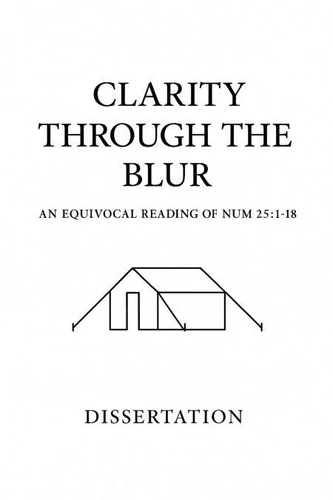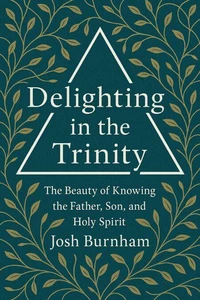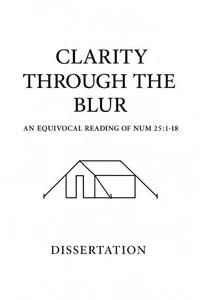- Accueil /
- Josh Burnham
Josh Burnham

Dernière sortie
Clarity Through the Blur: An Equivocal Reading of Numbers 25:1-18
This study offers a close literary reading of Numbers 25:1-18, the enigmatic account of Israel's sin at Baal Peor. Long regarded as a disjointed or composite passage, the text has puzzled interpreters for generations. Through an equivocal analysis-a method that attends to narrative gaps, ambiguity, and structural tension-this work argues that the apparent inconsistencies in the passage are not flaws but deliberate literary devices.
The narrator employs ambiguity to create unity, inviting readers to wrestle with the complexity of divine holiness, human failure, and priestly mediation. Methodologically, the research proceeds in three movements: Recognition of the text's equivocal character through historical and interpretive analysis. Close reading of the passage's macro and micro features-its themes, syntax, and narrative design-revealing how ambiguity and juxtaposition shape meaning.
Evaluation and application, demonstrating how equivocation clarifies the story's theological focus by blurring secondary elements. The findings illuminate a profound theological coherence within Numbers 25: Israel's covenant unfaithfulness is exposed; divine blessing and mercy persist through priestly zeal; and Yahweh emerges as the central actor whose holiness and steadfast love hold the story together.
Ultimately, this study contends that the blur of Baal Peor is the beauty of its design. Through narrative ambiguity, the text magnifies the unwavering faithfulness of God amid human betrayal-revealing judgment, atonement, and covenant grace woven seamlessly into one story.
The narrator employs ambiguity to create unity, inviting readers to wrestle with the complexity of divine holiness, human failure, and priestly mediation. Methodologically, the research proceeds in three movements: Recognition of the text's equivocal character through historical and interpretive analysis. Close reading of the passage's macro and micro features-its themes, syntax, and narrative design-revealing how ambiguity and juxtaposition shape meaning.
Evaluation and application, demonstrating how equivocation clarifies the story's theological focus by blurring secondary elements. The findings illuminate a profound theological coherence within Numbers 25: Israel's covenant unfaithfulness is exposed; divine blessing and mercy persist through priestly zeal; and Yahweh emerges as the central actor whose holiness and steadfast love hold the story together.
Ultimately, this study contends that the blur of Baal Peor is the beauty of its design. Through narrative ambiguity, the text magnifies the unwavering faithfulness of God amid human betrayal-revealing judgment, atonement, and covenant grace woven seamlessly into one story.
This study offers a close literary reading of Numbers 25:1-18, the enigmatic account of Israel's sin at Baal Peor. Long regarded as a disjointed or composite passage, the text has puzzled interpreters for generations. Through an equivocal analysis-a method that attends to narrative gaps, ambiguity, and structural tension-this work argues that the apparent inconsistencies in the passage are not flaws but deliberate literary devices.
The narrator employs ambiguity to create unity, inviting readers to wrestle with the complexity of divine holiness, human failure, and priestly mediation. Methodologically, the research proceeds in three movements: Recognition of the text's equivocal character through historical and interpretive analysis. Close reading of the passage's macro and micro features-its themes, syntax, and narrative design-revealing how ambiguity and juxtaposition shape meaning.
Evaluation and application, demonstrating how equivocation clarifies the story's theological focus by blurring secondary elements. The findings illuminate a profound theological coherence within Numbers 25: Israel's covenant unfaithfulness is exposed; divine blessing and mercy persist through priestly zeal; and Yahweh emerges as the central actor whose holiness and steadfast love hold the story together.
Ultimately, this study contends that the blur of Baal Peor is the beauty of its design. Through narrative ambiguity, the text magnifies the unwavering faithfulness of God amid human betrayal-revealing judgment, atonement, and covenant grace woven seamlessly into one story.
The narrator employs ambiguity to create unity, inviting readers to wrestle with the complexity of divine holiness, human failure, and priestly mediation. Methodologically, the research proceeds in three movements: Recognition of the text's equivocal character through historical and interpretive analysis. Close reading of the passage's macro and micro features-its themes, syntax, and narrative design-revealing how ambiguity and juxtaposition shape meaning.
Evaluation and application, demonstrating how equivocation clarifies the story's theological focus by blurring secondary elements. The findings illuminate a profound theological coherence within Numbers 25: Israel's covenant unfaithfulness is exposed; divine blessing and mercy persist through priestly zeal; and Yahweh emerges as the central actor whose holiness and steadfast love hold the story together.
Ultimately, this study contends that the blur of Baal Peor is the beauty of its design. Through narrative ambiguity, the text magnifies the unwavering faithfulness of God amid human betrayal-revealing judgment, atonement, and covenant grace woven seamlessly into one story.
Les livres de Josh Burnham
Nouveauté

2,99 €

